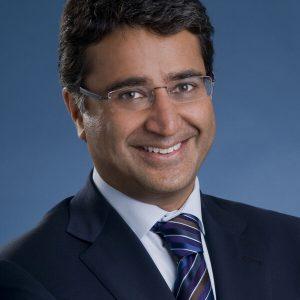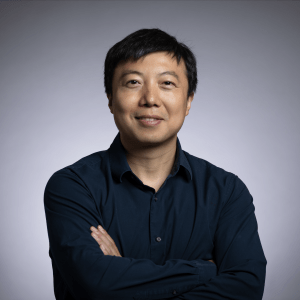The UHN AI Hub is a Collaborative Centre designed to augment human intelligence through healthcare innovation by continuously advancing AI technologies and accelerating their applications to provide the best possible care to patients and support healthcare providers.
Vision
Create a future where healthcare is more accessible, efficient, and personalized through the integration of AI technologies.
Mission
Augment human intelligence through healthcare innovation by continuously advancing AI technologies and accelerating their applications to provide the best possible care to patients and support healthcare providers.
Collaborative Centre Leads

Shaf Keshavjee, OC O.Ont MD MSc FRCSC FACS
Chief of Innovation, UHN
Director, Toronto Lung Transplant Program
Director, Latner Thoracic Research Laboratories
Professor of Thoracic Surgery & Biomedical Engineering Sprott Department of Surgery
Vice Chair Innovation, Dept. Surgery, University of Toronto
Shaf Keshavjee is a Thoracic surgeon and Director of the Toronto Lung Transplant Program. He is Chief of Innovation at University Health Network (UHN). He is Professor of Thoracic Surgery and Biomedical Engineering and Vice Chair for Innovation, Department of Surgery, Temerty Faculty of Medicine at the University of Toronto (UofT).
Dr Keshavjee completed his medical training at the University of Toronto in 1985. He subsequently trained in General Surgery, Cardiac Surgery and Thoracic Surgery at UofT followed by fellowship training at Harvard University and the University of London for airway surgery and heart-lung transplantation, respectively. He joined the faculty at UofT in 1994 and was promoted to Full Professor in 2002. Dr. Keshavjee was the inaugural holder of the Pearson-Ginsberg Chair in Thoracic Surgery and served as the Chair of the Division of Thoracic Surgery at the University of Toronto from 2004 to 2010.
Dr Keshavjee’s clinical practice is in thoracic oncology, lung cancer and lung transplantation. He has a passion for surgery and innovative research. He is a Senior Scientist in the Toronto General Hospital Research Institute, UHN. He leads a large team of researchers in a foremost pulmonary research program and is widely published in the field. His specific research interest is in lung injury related to transplantation. His current research involves the study of support systems, molecular diagnostics and gene therapy to repair organs and to engineer superior organs for transplantation.
Dr. Keshavjee has served on the board of directors of the International Society for Heart and Lung Transplantation, the Canadian Society of Transplantation, and the American Association for Thoracic Surgery, where he also served as Treasurer and 102nd President. He has received numerous awards for contributions to medicine, including the George Armstrong Peters Young Investigator Award, Canada’s Top 40 Under 40 Award, the Colin Woolf Award for Excellence in Medical Education, and the Lister Prize in Surgery – the highest award for research achievement in the Department of Surgery at UofT. He is a Fellow of the Canadian Academy of Health Sciences and has been awarded Honorary Doctor of Science Degrees from both Ryerson University and Queen’s University. He was also awarded an Honorary Fellowship to the Royal College of Surgeons of Edinburgh for his service to mankind.
He received the Lifetime Achievement Award from the Canadian Society for Transplantation, the Lifetime Achievement Award from Canadian Blood Services, and the American Society of Transplantation Innovation Award for contributions to the field of lung transplantation. He received the prestigious Flance-Karl Award (2021) from the American Surgical Association – awarded to a surgeon who has made a seminal contribution in basic laboratory research which has been applied to clinical surgery for his work in ex vivo organ perfusion. He also received the FNG Starr Award (2021) – the highest national award from the Canadian Medical Association recognizing a physician for their outstanding and inspiring lifetime achievement.
Dr Keshavjee has received two Queen Elizabeth II Diamond Jubilee Medals and the national Governor General’s Award for Innovation. He was awarded the Order of Ontario in 2014 and received Canada’s highest civilian honour in 2013 with an appointment as an Officer of the Order of Canada.

Bo Wang, PhD
Chief AI Scientist at UHN and Canada Research Chair in Artificial Intelligence for Medicine,
Vector Institute Faculty Lead
Artificial Intelligence Scientist, PMCC, UHN
Faculty of Medicine, University of Toronto,
Canada CIFAR Artificial Intelligence Chair
Dr. Bo Wang is a tenure-track Assistant Professor in the Departments of Computer Science and Laboratory Medicine & Pathobiology at the University of Toronto. He is the inaugural Temerty Professor in AI Research and Education in Medicine. Dr. Wang is the Chief AI scientist at the University Health Network, the largest research hospital in Canada. He also holds a CIFAR AI Chair at Vector Institute. Dr. Wang obtained his PhD from the Department of Computer Science at Stanford University in 2017. Dr. Wang’s research focuses on machine learning, computational biology, and computer vision, with a particular emphasis on their applications in biomedicine. His significant contributions to these fields have led to his recognition through numerous esteemed awards, including the Gairdner Early Career Researcher Award and the Canada Research Chair Award.
Generative AI Contest
THE CHALLENGE
How can generative AI (GPT-4) be used to improve healthcare? We asked researchers from across UHN to think of creative ideas for how to use generative AI such as GPT-4 to improve the healthcare industry for a chance to work with the UHN AI Hub to bring their idea to life.
THE WINNERS
Thank you to everyone who applied to the Generative AI Contest. We had an overwhelming response of impactful ideas for applying generative AI to different domains of healthcare across our institution. We are delighted to announce that we will be moving forward with three successful candidates to further develop their innovative project ideas.
Introducing Efficiencies into Clinical Genomics Reports through AI |
AI for Institutional Authorization |
Post-Operative Navigator: Leveraging Large Language Models (LLMs) to Enhance Post-Operative Care |
| Dr. Hanna Faghfoury Clinical Genomics, Clinical and Metabolic Clinician |
Dr. Helen Fan StRIDe, RSS |
Dr. Jethro Kwong Division of Urology, Department of Surgery |
What is Generative AI?
Generative AI is a cutting-edge class of artificial intelligence algorithms that can create new and original content. GPT-4 is a specific generative AI language model that is capable of generative human-like text and understanding of complex language structures.

